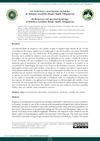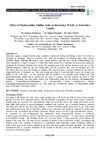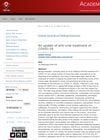 1 citations,
August 2020 in “Food Research”
1 citations,
August 2020 in “Food Research” Plant extracts like Avicennia marina, Boehmeria nipononivea, and Camellia sinensis could potentially treat hair loss with fewer side effects than synthetic drugs.
 1 citations,
May 2017 in “InTech eBooks”
1 citations,
May 2017 in “InTech eBooks” Some natural remedies may help with hair regrowth, but more research is needed to confirm their effectiveness and safety.
 1 citations,
January 2015 in “Side effects of drugs annual”
1 citations,
January 2015 in “Side effects of drugs annual” The document concludes that various dermatological treatments and drugs can cause skin reactions and side effects.
 July 2024 in “Science and Culture”
July 2024 in “Science and Culture” Thuja orientalis L. has many health benefits and could be used in new medicines.
 May 2024 in “Journal of drug delivery and therapeutics”
May 2024 in “Journal of drug delivery and therapeutics” Women with PCOS have higher oxidative stress and hormone imbalances, suggesting managing oxidative stress could help.
 April 2024 in “Journal of pharmacy & pharmacognosy research”
April 2024 in “Journal of pharmacy & pharmacognosy research” A compound from Calophyllum inophyllum L. leaf may help treat non-small cell lung cancer.
 December 2023 in “International Journal of Research in Ayurveda and Pharmacy”
December 2023 in “International Journal of Research in Ayurveda and Pharmacy” Ayurvedic remedies may boost immunity and balance in cancer treatment but need more research.
 December 2023 in “Medicine and Materials”
December 2023 in “Medicine and Materials” Essential oils are increasingly used in cosmetics for their natural benefits but must be used carefully to avoid skin reactions.
 December 2023 in “Bulletin of the Medical Institute of Continuing Education”
December 2023 in “Bulletin of the Medical Institute of Continuing Education” Angelica Dahurica extract helps reduce hair loss and improve hair growth and scalp condition.
 October 2023 in “International journal of research in Ayurveda and pharmacy”
October 2023 in “International journal of research in Ayurveda and pharmacy” Keedari thailam is effective for treating alopecia areata and has multiple health benefits.
 June 2023 in “Journal of chemical metrology”
June 2023 in “Journal of chemical metrology” A new method found unlisted drugs in two popular hair serums, posing a health risk.
 June 2021 in “Journal of emerging technologies and innovative research”
June 2021 in “Journal of emerging technologies and innovative research” Onion and Aloe vera can help protect hair from damage caused by hair dyes.
 December 2020 in “Rev. Amazon.”
December 2020 in “Rev. Amazon.” Monnina crassifolia, Aloe vera, and rosemary are commonly used for hair conditions in Angochagua, Ecuador.
 December 2018 in “Esperienze dermatologiche”
December 2018 in “Esperienze dermatologiche” A lotion with Centella asiatica extract reduced hair loss by 41% and increased hair strength without side effects.
 September 2018 in “Asian journal of pharmacy and pharmacology”
September 2018 in “Asian journal of pharmacy and pharmacology” Honey has many health benefits and is good for you.
 June 2018 in “Disease-a-Month”
June 2018 in “Disease-a-Month” Remove inflamed cysts surgically, avoid topical antibiotics on wounds, treat skin and mouth conditions with specific medications, and address underlying causes of hair loss.
 April 2018 in “Journal of Ayurvedic and herbal medicine”
April 2018 in “Journal of Ayurvedic and herbal medicine” Computational methods can speed up and improve the development and safety of herbal drugs.
 January 2018 in “Springer eBooks”
January 2018 in “Springer eBooks” Lasers are FDA-approved for permanent hair reduction, not removal, and more research is needed to improve treatments.
 July 2017 in “International journal of Ayurvedic and herbal medicine”
July 2017 in “International journal of Ayurvedic and herbal medicine” Madayantika Siddha Taila is effective for treating Seborrhea capitis.
 January 2017 in “Korean Journal of Pharmacognosy”
January 2017 in “Korean Journal of Pharmacognosy” Modified red ginseng extract promotes hair growth and has antioxidant and anti-inflammatory effects.
 January 2017 in “Elsevier eBooks”
January 2017 in “Elsevier eBooks” The Christ’s Thorn Jujube tree has many uses, including medicine, food, and industry, due to its beneficial properties.

Off-label drug use can be risky but sometimes beneficial when standard treatments fail.
 November 2015 in “Clin-Alert”
November 2015 in “Clin-Alert” Some medications and supplements can cause serious side effects, including hair loss, heart rhythm problems, liver injury, and other health issues.

Some medications can cause hair loss, and it's important to track when the hair loss starts after taking a new medication.
 January 2008 in “Elsevier eBooks”
January 2008 in “Elsevier eBooks” More men are getting cosmetic surgery, with nose jobs and hair transplants being popular, and choosing a qualified surgeon is important.
 June 1998 in “Biomedicine & Pharmacotherapy”
June 1998 in “Biomedicine & Pharmacotherapy” Medical treatments like chemotherapy and radiotherapy can harm sperm production, so freezing sperm before treatment is important for men who want children later.
 January 2021 in “International Journal of Dermatology”
January 2021 in “International Journal of Dermatology” Possible link between COVID-19 and hair loss; more research needed.
 51 citations,
August 2021 in “Turkish Journal of Medical Sciences”
51 citations,
August 2021 in “Turkish Journal of Medical Sciences” As of December 2021, the most effective COVID-19 treatments were monoclonal antibodies and possibly early-administered convalescent plasma, while several drugs were found ineffective or were still under evaluation.
4 citations,
June 2022 in “Journal of food bioactives” Eating plant-based anti-inflammatories and antioxidants may help manage long-term COVID-19 health issues.
 4 citations,
October 2020 in “Research Square (Research Square)”
4 citations,
October 2020 in “Research Square (Research Square)” Early treatment with certain drug combinations improved COVID-19 outcomes and prevented severe disease in males, including those at higher risk.





























